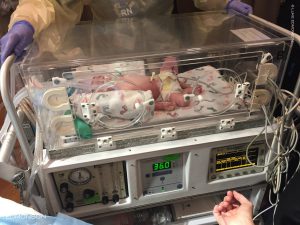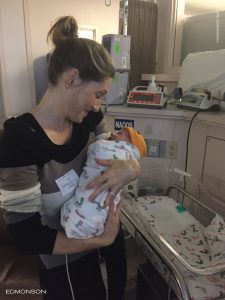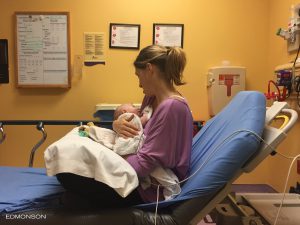Hope for HIE is a wonderful organization full of other dedicated families in similar situations. Every day new parents join on Facebook or read this website full of questions, uncertainty, and searching for hope. Maybe you got here because you searched for “What is HIE? Hypoxic-Ischemic Encephalopathy.”
I feel like I’ve gained some perspective on what our process was like regardless of the results.
It’s only fair to share that many of the answers you are seeking can’t and won’t be known for some time by anyone. The laundry list of “What HIE Can Cause?” is longer than any parent would like to read but what is critical for you to hear is that every situation is unique.
And that’s why I’m taking time to write this blog post. So many other parents and I are in your shoes, not in the past tense kind of thing because we all learn that it’s an ongoing process.

Rhett Edmonson turning 1 year old captured in father’s studio.
Today is our son Rhett’s first birthday, and what a great reason for me to reflect and share a bit perspective as to what our road was like regardless of the results.
While we eagerly anticipated the arrival of our boy, life around our house was a bit different with the 2nd pregnancy. Our daughter Holland is 2 1/2 years older and certainly kept us on our toes with all of her energy! The day before his birth my wife Bethany and I met up for lunch with her for one last family meal before 3 became 4.
Early the next morning before sunrise, Bethany woke me to say we need to go the hospital…now! I can remember letting her out at the entrance and going to park the car. By the time I walked inside, she was already on the bed and just starting the initial check-ups with the labor and delivery nurse.
The fetal heartbeat monitor wasn’t even attached, just starting to go into place when we overheard a nurse comment that our son sounded in distress.
A sudden breaking of my wife’s water meant that everything we mentally planned for his delivery was out the window. She is the real heroine of this story doing more than she ever thought she could to bring him into the world as quickly as possible.
Within 15 minutes of arriving at the hospital, our son was born.
The resident who delivered him knew the cord was wrapped around his neck several times and once around his body and he wasn’t responsive.
The activity in the room increases, the labor, and delivery nurses do their thing.
As a parent, all you want to hear is a cry or sign of life.
More people rush into the room as the call goes out for the NICU team.
Comments fill the air like, “Unresponsive. Low or non-existent Apgar scores. Blue skin.”

Watching our son, Rhett, being transferred to the NICU just after birth.
There is a natural range of emotions and questions swirling around the atmosphere during this chaotic time, almost like a triage of sorts affecting both mom (still recovering from the delivery) and dad individually as well as family and friends.
It’s where the meaning of the word Hope cements itself in your mind.
HOPE: noun: “a feeling of expectation and desire for a certain thing to happen.”
A mixture of reliance on faith for a positive outcome in the face of adversity and a sudden crash course in understanding what’s going on. That’s why it helps to learn from the experiences of others to know how to best advocate on behalf of your newborn.
I vividly remember seeing Rhett heading up to the NICU and the desire to want to hold your child (emotionally) while intellectually understanding it’s not possible right now. His one little open eye, a bit more hope to latch onto before he left us.
While still recovering in the delivery area, a brief visit from the NICU Dr. became the first time we heard about his status.
They shared he had HIE and that he is a candidate for a treatment called “Cooling.”
I remember hearing something about 3 days of lowering his body temperature to try to mitigate the effects.
It’s probably good for you to understand that many factors go into consideration before your child receives cooling. Like many brain injuries, there is a time-sensitive window to take action beyond which the benefits aren’t as clear. Depending on the capabilities of the hospital you are at your baby may be transferred to a larger one that has this treatment as an option.
And it may not even happen. You’ll come to learn that there is, in essence, a workflow type chart that has to happen to be eligible.
Unless the different boxes check with an ultimate answer of cooling protocol, your situation may be different.
It’s also good to say to you that cooling by itself is not an antidote. It’s simply one of medicine’s attempts to mitigate the effects of the brain injury.
Mitigate: noun: “make less severe, serious, or painful.”

First time Mom got to hold our baby after 3 days of cooling.
By now we were hitting a tortuous time for us as parents, our family and friends in a world full of uncertainty, mini-milestones, and adrenaline.
More terms like Seizures, MRI, EEG, Acid Levels, Grade I, II, III, Respirators, etc. whirl around.
By now you’ve been able to look in on your little one, and it’s understandable to feel entirely helpless in the current situation.
You’ve played everything back in your mind many times and will continue to do so.
What went wrong at or before birth?
“What if we had a C-Section?”, “Shouldn’t the OB-GYN have seen the cord wrap on the ultrasound?”, “What if we got to the hospital earlier?” and on and on.
Certainly, there are clear cases of negligence and legal recourses to consider, but at the same time, it’s also important to consider that birth, in general, is a miracle. And that sometimes means things happen in life and rather than assign blame shift that energy into searching for what you can do that’s positive.
Like what you can do to best get up to speed to advocate on your child’s behalf.
I’d suggest to you that at any point in your process Faith, Hope and Love are cornerstones to becoming the best parent you can be today for your child.
Part of that means becoming “Conversational” about the lingo the medical professionals around you are using.
You may be tempted to dive into research, which is a good thing to do. Other personalities don’t even want or are capable of considering anything but the “Best” outcome.
While research and studies you find online can guide you, they are not a magic bullet and depending on your personality can cause you to become depressed.
Some babies recover, others partially recover, and there are those that get a swift promotion up to heaven.
What does help to know is that depending on the personality of the Dr.’s they may or may not be excited about you “Learning” too much because their only goal is to do what they think is best to “Stabilize” your baby.
Don’t take it personally if some are very warm, while others appear cold and clinical. Make your goal to have a clear understanding of the situation and align that with their goals to get your child to the next step. Whatever that may be.
It could be to get the blood gases to a better place, or for urine production to start, minimize or absence of seizures. The best way to say it is that your situation is unique including a heartfelt goal to stabilize the vital signs enough to start down the road to healing.
The NICU professionals aren’t and rightfully shouldn’t be thinking about what your life will be like in a week, month or years from now. They don’t always know the outcome because they aren’t going to be the ones following up with your child.
Mini-milestones in the NICU are things like:
1. No seizures for 24 hours
2. EEG test results and interpretation
3. MRI test results and interpretation
4. Feeding successfully through their mouth
5. Occupational Therapist exams
Behind the scenes, I’ve come to appreciate that they are watching the overall trends, not putting too much emphasis on one particular test result.
However natural it is to wish for concrete answers be smart enough to learn about things like rhythmic movements or bicycle kicks while doing your best not to obsess.
While cooling, it’s most likely that your baby is being sedated anyways which makes it hard for anyone to act natural.
Helpful Tip:
One great thing is to give an invitation for the medical professionals to share more information with you. Ask them, “Is there anything I’m not asking that I should be?”
I observed in our case that the different Dr’s, Nurses, Therapists, etc. tailored their responses to the emotional state of the person asking them.
A visibly emotional family member might receive a hug and token response infused with a general sense of optimism. It became apparent that they didn’t share anymore because the “Adult” isn’t capable of hearing it.
Conversely, if it’s obvious that the person listening can process both information and uncertainty, then it’s more likely they will open up about where you are right now and what’s coming up next.
Not what life will be in 6 months but here’s what we are shooting for by the end of today, tomorrow, the next day.

Back in the hospital weeks after leaving NICU.
By now you probably are balancing life in shifts between home, work, and the hospital. You’ve got a collection of parking passes and made quite a few new friends at the hospital along with sending out regular status updates on social media.
Maybe you’ve even showered.
Sounds simple but after the past couple days, it’s likely you’ve skipped a meal or two.
New moms may be pumping, and everyone is anticipating the “Warming Up” process if you’ve been on the cooling treatment. It’s another “wait and see” type process. Can the infant hold temp? Wean off the respirator and breathe on their own? What is the EEG showing?
At anytime something can and probably will throw you a curveball.
We all like to think of recovering as a linear process, but it’s often two steps forward, one back or may just a temporary hold in place.
You’ll feel an overwhelming urge to want to pick up and cuddle with your love bug. Especially with all the tears and prayers you’ve shared with them during the past few days. It’s hard to wait but that day is coming…when they are ready.
Be prepared for lots of whispers into tiny ears, even more, tears and additional updates from the medical team.
Helpful Tip:
A NICU video monitor is an excellent way to look in when you’re not at the hospital. Ask if there is one available and use it to connect with your baby.
Speaking of connections, find ways to connect with your child even if you can’t be there 24/7 which in truth, you can’t.
This time is also a good place to start learning about your insurance coverage(s) and what to expect afterward along with the maximum out of pocket expenses.
It will help to start getting organized from the beginning because you’re going to need copies of the medical and billing paperwork down the road.
And if your baby is warmed and it is going great…guess what?
Finally, it’s time for Mom & Dad (and maybe a few eager grandparents) to cuddle with your precious new addition.
Still, the NICU experience keeps going with the EEG test and MRI.
Trying to pin down a neurologist as to exactly what they mean when they give an interpretation of “abnormal results consistent with HIE” is frustratingly futile.
What do they mean by it?
Are they only covering themselves because they know they are looking at a HIE child? Or are they really seeing something in the test results?
Who knows? The EEG is a test, not an outcome.
Probably your best source of information is one of the caring nurses or therapists.
During the entire stay in the NICU, they are looking at how their body is responding physically. Before you jump into finding out if they are concerned, just know that their tests run over a period and failure one day doesn’t make or break you. What they are watching for is a trend, and soon you’ll start to get answers to the likely prognosis.
The day of your MRI will be full of hope, fear, and trepidation.
Will your worst fears be realized?
Will the results come back normal?
On some level, what effect will the preceding days have on the rest of your life?

Before our son was born, I’d naturally and somewhat cavalierly say to people that asked, “10 fingers & 10 toes, healthy baby and I’m happy!”
I don’t blame myself for lacking empathy in an area I didn’t have experience, capacity or maturity.
But now I recognize a genuine nature of that well-intentioned statement.
We’ve learned that regardless of the ultimate situation you find yourself with your precious little one….they are your child.
And you love them. No matter how perfectly imperfect they are.
That is not to say it will be easy…far from it.
Depending on your strength and energy at any particular moment and how much “research” you’ve been doing, you’ll probably find yourself soaring through the various high and low emotions from “We’ve got this!” to “How can this be?”
In our case, our son’s initial diagnosis was Grade II that after cooling received a clean MRI, “mildly abnormal EEG,” with promising commentary from the occupational therapist.
The only evidence of seizures was his first day in the NICU as seen by the nurses.
We left the NICU 9 days after we entered.
At the time, the hospital staff shared that in their experience only once every 10 years or so do they see a HIE baby get out in 10 days or less.
If you join the Hope for HIE Facebook Group, over the next year, you WILL see families who are on day 35, 50, 65+ and their child is still in the NICU. Moms who are still pumping milk for an infant that can’t go home.
Encourage these courageous women that are giving so much of themselves for their little ones.
There WILL be parents of children figuring out feeding tubes and trying different seizure medicine combinations with various positive and negative results leaning on each other for answers.
If you are part of this group, be aware that parents are reading your posts even if they are not commenting.
Some emotionally can’t. Others may feel some guilt if their loved one’s outcome is better than others while some just don’t want to allow themselves to consider anything but positive outcomes.
What is beautiful is the community of so many willing to help guide, comfort and walk down the road with you.
It’s a network of support that lasts long after you leave the hospital.
It’s an emotional event to be home!
By now, you’ve probably got a feeling for where you are (at this point) and what special situations you find yourself in with your child.
Many states offer outside help (if needed) for therapy, tap into it!
Make life easier on your family by having them come to your house whenever possible.
Instead of dwelling on the negative events of the past, just love on you remarkable child.
Snuggle, feed, connect and wait.
There will be more tests, conversations with your Pediatrician, bills that start arriving, watching and waiting.
Somehow in the midst of it, enjoy the gift that is the life in front of you. They are yours!
By now, there might be new thoughts about other things that could have been. What about stem cells? What were our cord gas levels again? Maybe your child didn’t get cooling or why didn’t your hospital do this or that?
Keep track, be responsible but also understanding that what’s happened up to this point is done. What you can start doing right now is love that beautiful child right in front of you!
In our case, we did have a promising OT test when we got home initially and at 3 months. Not perfect but positive.
At 6 months to the day, we met with the Pediatrician who specializes in following up with all the NICU babies from our hospital.
One of the tests was for him to sit up unassisted. Our son kind of did it but not 100%.
Still, the Dr. felt optimistic and charted him down the middle in most things.
The very next day, Rhett sat up on his own assisted.
We will follow-up one more time now that he is a year old.
By that point, the Pediatrician believes he will know if there is a possibility of CP.
Another of the laundry lists of possible issues that may or may not arise for your child and your family to overcome.
If there is a recurring theme to this process, it is learning to balance watching out for things and simply enjoying life with your little one.
If you are new to this group or this process you are searching to find out what life is going to be like for you and your baby.
50/50 chance at a “normal” life?
Will your child get promoted to heaven within the next 24 hours?
None of that is known, and once you spend a year in the community, you will see the full gamut of outcomes.
You are here because you HOPE for the best (as we all should) while searching for answers, support, and encouragement.
The answers you seek may or may not make themselves known when and how you want them.
Sometimes not having an answer yet is better than a complication that rears its ugly head.
Support is something you will receive from the very start by medical professionals, but once you leave the hospital, it continues through the community network of other parents in similar situations.
Support is also something you can potentially give back to others.
Enjoy the journey of watching your little one continue to grow and develop. The will amaze you!
HIE is not something that affects just a single member of your family.
The effects resonate through the entire family.
My biggest encouragement?
Give yourself and the other people in your life grace.
Grace to feel, research, process, mourn, celebrate.
Then…when you are ready, put aside your worries and revel in the remarkable gift right in front of you.
Our story would not be complete without mentioning that just weeks after getting home from the NICU we were back in the hospital.
While it’s more likely babies don’t get fevers when being breastfed, in this case, my lack of knowledge meant I checked his temperature.
It was very high (103 F), and he was sick.
The feeling of returning to a hospital, running more tests, spinal taps, my sweet wife living in a hospital room again…well you can imagine the feeling of “this shouldn’t be happening.”
But it is. So now, what do we want to do about it?
Those nights and days in the hospital tested us once again emotionally and energetically.
Ultimately the fever broke without any real diagnosis.
Just more learning how to become comfortable in the midst of uncertainty.
Does our son catch more colds and ear infections than other kids his age? Sometimes it feels like that!
Could it be that he has a big sister in pre-school bringing home lots of fun little bugs? For sure.
Have we noticed that he likes us to hold him “all the time?”
Most definitely.
Is that his personality? Is that something we’ve fostered as we’ve been at types hyper-sensitive to his needs? Does it have to do with the fact that he didn’t get to connect with us at birth and it was days before we could ever hold him?
Finding the balance between being sensitive to your child and taking care of yourself and the rest of your family isn’t always easy.
The best we can do is be optimistic about the future, our desires, and expectations for a great life ahead.
I’ll leave you with a letter I wrote in an e-mail to our daughter while waiting for the Rhett’s MRI results.
“Hey Holland,
Sitting in the waiting room waiting for your brother Rhett to get his MRI. It’s a big day & hopefully, he’ll be coming home soon. I want you to know the peace I have & it comes from Jesus. Do not be anxious for anything he says. Translated, “I’ve got this.”
God doesn’t need a Plan B in life because Plan A is perfect already.
He uses all things for good.
Including bringing you and Rhett into our lives.
You are a nut. A wonderful & adorable nut. Your language skills are amazing us everyday. You tell us that you love us & you give the sweetest kisses. I love doing “noses” with you which is Eskimo kisses.
You love to swing, you swing & swing & swing & we listen to Daddy’s music.
Guess what I learned searching for the meaning of Rhett’s name?
His name means “Ardent & Fiery.”
Yours in internet slang is what caught my attention.
HOLLAND
Hope Our Love Lasts And Never Dies!
I love it.
So Hollandaisel, my dear, I hope our family’s love lasts and never dies. 🙂
Love you!
Dad”
About The Author
I’m a Husband, Father, and Brother living in Dallas, TX. As a 3rd generation photographer, we believe that our calling is to “love on others and have influence in their lives. Our excuse? We have a camera.” Just like we feel there are “Stories Worth Telling” visually, the experiences of parents of a child diagnosed with HIE are worth sharing. Please join me in supporting the Hope For HIE community by participating in HIE Awareness Month, Donating , or finding ways to Connect.
Connect with families, read inspiring stories, and get helpful resources delivered right to your inbox.